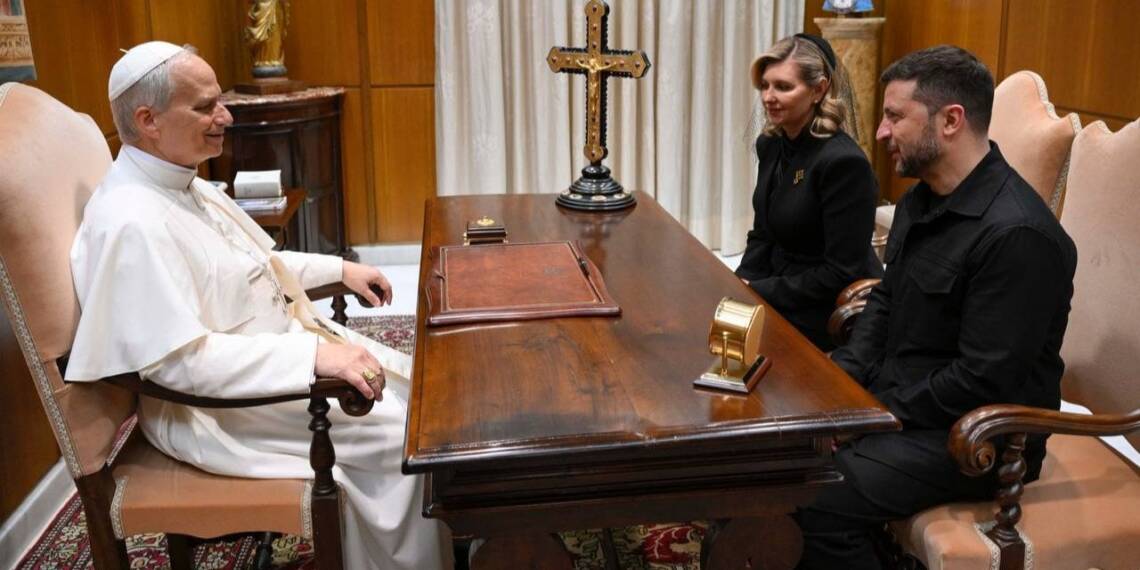In a bold push for diplomacy amid a grinding war, newly elected Pope Leo XIV is being floated by global figures—including the U.S. President Donald Trump and Italian Prime Minister Giorgia Meloni—as a potential mediator in the Russia-Ukraine conflict.
Pope Leo XIV (Robert Francis Prevost) was elected on May 8, 2025. He was chosen at the 2025 papal conclave following the death of Pope Francis. As the first American pontiff, Pope Leo may bring a fresh perspective and a deep emphasis on peace in the ongoing clash.
Why the Pope?
Supporters of the idea argue that Pope Leo XIV holds a unique kind of influence: moral authority unmarred by political entanglement. Trump has argued that traditional diplomacy has failed and that “a neutral, global spiritual leader” may offer the only way forward. Meloni has stated that the Pope’s offer to host peace talks in the Vatican “could break the diplomatic deadlock” if both sides show willingness.
The Pope’s symbolic role and commitment to humanitarian principles have made him an attractive candidate for initiating dialogue, especially in an environment where trust in traditional diplomatic institutions has eroded.
While the Pope is no stranger to backchannel diplomacy, the road to effective mediation is steep. The Vatican lacks direct political leverage or military enforcement power. Moreover, any Vatican-led peace process would need buy-in from both Ukraine and Russia—something that’s far from guaranteed.
Ukraine’s Perspective
Ukraine has responded with cautious openness. President Volodymyr Zelensky, while not rejecting the idea, has emphasized the need for any talks to respect Ukraine’s sovereignty and territorial integrity. Kyiv remains skeptical of any peace plan that does not include a complete Russian withdrawal from occupied territories. Some Ukrainian officials have also expressed concern that religious neutrality might be difficult, noting past criticisms of the Vatican’s perceived hesitance in fully condemning Russian aggression.
Still, Pope Leo XIV’s emphasis on humanitarian aid and civilian protection has resonated with many Ukrainians who see a possible humanitarian role for the Church even if political mediation proves elusive.
Russia’s Response
The Kremlin has not issued a formal statement on the proposal, but Russian state media have taken a measured tone. Analysts close to the Kremlin have noted that Russia may view the Vatican more favorably than Western governments or NATO mediators, given the Church’s tradition of back-channel diplomacy and its global, non-military stature.
However, some hardliners in Moscow view any mediation effort with suspicion, particularly if it’s seen as leaning toward Ukraine’s Western allies. Russia’s ultimate willingness to engage through the Vatican may hinge on the conditions attached to talks—and whether such a process could be used to secure sanctions relief or legitimacy.
Where Pope Leo XIV Stands?
Since his elevation, Pope Leo XIV has repeatedly called for de-escalation and the protection of innocent lives. While maintaining neutrality, he has condemned the suffering caused by war, urging “an end to hostilities that betray the dignity of the human person.”
Pope Leo XIV has called for unity at his inaugural Mass at the Vatican attended by thousands of faithful and world leaders including Ukraine’s Volodymyr Zelensky.
In a prayer afterwards, he noted the efforts for a ceasefire in Ukraine, before holding a private audience with Zelensky and his wife.
The Pope had also offered the Vatican as a venue for possible peace talks after Russian President Vladimir Putin turned down Zelensky’s offer to meet face-to-face in Turkey for negotiations.
His messages so far suggest a clear desire to position the Vatican as a bridge-builder, emphasizing that “peace must be pursued even when it seems distant.”
Pope Leo XIV’s name being floated as a mediator signal more than a shift in tactics, it reflects a new view in the deeply polarized conflict. Whether he can manage to use that symbolic power into tangible peace remains uncertain, and whether Putin and Zelensky will accept the accorded terms is an entirely different debate. However, it is at least a new step in the efforts to find a solution to the long-drawn Russia Ukraine war.








